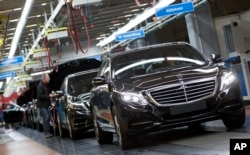A year ago in Sicily at the G-7 summit of leading industrial nations, U.S. President Donald Trump was at loggerheads with his fellow summiteers primarily over climate change. At this year’s annual meeting starting in Canada Friday, the dispute will be over tariffs.
European and Canadian participants remain fuming over Trump’s decision to impose tariffs on their steel and aluminum imports — an issue which will dominate a summit planners were already struggling to agree on an agenda ahead of the U.S. president’s decision to include close allies in the new metals tariff regime.
The U.S. President will find himself without an ally when it comes to tariffs, say European and Canadian diplomats.
“There will be disagreements on important issues and tariffs will certainly be one of them,” a Canadian official told reporters midweek.
Even Britain’s Theresa May, who has declined to keep in step with her fellow Europeans and threaten retaliation, fearing apparently to do so could sink Britain’s chance of a post-Brexit deal with the U.S., has made her disapproval clear. She told Trump in a 30-minute phone call that the tariffs on EU metals are “unjustified and deeply disappointing” and urged him to exempt the Europeans.
But behind the united front of disapproval there are deep disagreements among U.S. allies — especially among the Europeans — about how to respond and whether to take retaliatory action. And if so, what counter-measures to introduce. The disagreements partly stem from different interpretations about what’s driving the U.S. president.
Is Trump being opportunistic and mercurial and playing to a domestic American audience seeking to secure short-gains or is there are an overall longer-term strategy, one at odds with the global free-trade system Washington largely shaped and has backed since the end of World War II?
Is he wanting to change or "re-balance" the terms of global free-trade by using U.S. leverage to reshape rules or is he out to wreck a rules-based system entirely, thereby creating a free-for-all which allows the largest, most powerful countries to exploit their power to the full, secure better deals and lift trade barriers impeding them?
Despite Trump’s rapport with his French counterpart, Emmanuel Macron, Paris has been among the hardest pushing for retaliation, along with top EU officials, viewing the U.S. President’s decision to cite national security as the grounds for the tariffs on steel and aluminum as a direct challenge to the rules-based global trade system overseen by the World Trade Organization.
CNN reported last week that Macron and Trump clashed during a phone call in a conversation described as “terrible” by an unidentified White House source. In a statement issued by the Elysée Palace before the call, Macron said the U.S. tariff imposition was “a mistake on many points. It is a mistake because it responds to a worldwide unbalance that exists in the worst ways through fragmentations and economic nationalism.”
Germany, which runs a large trade surplus with the U.S. and has more to lose than most European nations from a full-blown transatlantic trade, has been more reticent with German businesses — especially in its auto sector — urging Berlin to proceed cautiously.
German car-makers’ biggest fear is that EU retaliation — Brussels has already published a list of U.S. products that could be targeted — will result in the U.S. imposing tariffs on German cars.
Trump has lambasted in the past the 10 percent EU tariff on car imports. On May 23 the Trump administration announced an investigation into whether car imports are a threat to U.S. national security, too. A German magazine reported last week that Trump told Macron in April he wanted German carmakers out of the United States altogether. The report was based on unnamed sources and hasn’t been confirmed by either the White House or Elysée Palace.
German car-makers are banking on President Trump’s not raising U.S. duties to 25 percent on all imports of automobiles and auto parts, arguing that to do so will hurt American workers as much as German ones.
An analysis by the Peterson Institute, a Washington think tank, has suggested the fallout for the U.S. auto industry from such tariffs would be harsh as well with a possible 195,000 American workers losing their jobs over a three-year period. But projected chain-supply job consequences in the U.S. from the metals tariffs imposed on June 1 did not deter the Trump administration and EU retaliation could well prompt, German officials fear, Washington to respond with tariffs on auto imports.
According to some analysts and European officials, it doesn’t really matter whether Trump has a longer term-strategy to end rules-based trading or is determined to tug the global system in a direction that favors the U.S. more, making the rules anyway less predictable. Up to a point, the consequences are the same, they say.
“In a world where there are no internationally predictable rules, most countries faced with protectionist actions, crudely, have two options — retaliate or concede. If they choose to retaliate, the optimal strategy is to cause enough pain to the political leadership of the protectionist country that they will back down,” argued Matthew Oxenford, an analyst at Britain’s Chatham House.
He added: “However, this can only be effective for large economies that the U.S. exports to significantly. For smaller countries without significant leverage, the alternative is to concede and try to negotiate a favorable settlement, which will still be asymmetrical.”
That is the policy South Korea has followed, agreeing to quotas on their steel exports to the U.S. in exchange for a permanent exemption.
For all of the rage and fury in Europe about the metal tariffs, amid disunity about how to respond, that may well end up as the result with the EU, too, but probably not in Canada this week. U.S. officials say they expect a long rocky road ahead and they doubt there will even be an agreed joint statement at the end of the summit, emphasizing how the G-7 is becoming increasingly, in the eyes of observers, a G-6 plus 1.








